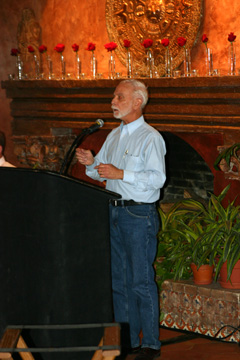 “That took courage,” one of the lawyers said afterward.
“That took courage,” one of the lawyers said afterward.
“Travis Young is a brave man,” said another.
What did the longtime Fort Worth attorney do to earn such peer praise? He criticized the good ol’ boy system in local courts. Young, who made about $29,000 last year as a court-appointed attorney in addition to his private practice, pointed to other lawyers who had raked in five to 10 times as much by representing poor defendants. Judges are supposed to spread those cases among a long list of qualified attorneys. Some judges, however, call on favorites more often than others.
It took a while for Young to get started. First, he asked the crowd in the back room at Joe T. Garcia’s Mexican Restaurant whether any reporters were there. He didn’t want the news media listening, because, he said, the problem could be solved in-house.
“We don’t need their help,” he said.
The fellow in charge of the meeting started toward a Fort Worth Weekly reporter, but other attorneys stopped him. Several said they wanted the media there because the problems at the courthouse had been covered up for too long.
“Sit down, you’re not going anywhere,” a lawyer said firmly to the Weekly reporter.
Young lamented that he would have to tone down his remarks, but went ahead. His original speech must have been a doozy — even the toned-down version was impassioned and accusatory.
“We have an emergency. We have a crisis,” he said of the case appointment system. “I don’t want trouble, but trouble is going to come if people don’t listen.”
Young described how judges are sidestepping the state’s Fair Defense Act and continuing to give the nod far too often to their favorite attorneys, a system he described as patronage. The law, enacted in 2001, was designed to speed up the process of getting legal representation for poor defendants and to ensure competent representation, in part by prompting judges to choose lawyers from a pre-approved list.
That computerized list is known in Fort Worth as “the wheel.” Cases are supposed to be assigned in order on a rotating basis. If an attorney is busy or unable to accept a case, a judge is then supposed to go to the next name on the wheel. The assigned attorney meets with the client and then gets back in touch with the judge.
The law “changed more than just the wheel. It made what we used to call patronage illegal,” Young said, referring to favoritism shown to lawyers who could be trusted to convince defendants to enter a plea and avoid trial.
Before the law, also called Senate Bill 7, was passed, judges frequently gave the majority of their court appointments to a small handful of attorneys, often appointing the same attorney to represent a half-dozen or so defendants at a time, all called up on the same “jail run.” At the time, critics charged that judges favored attorneys who would convince their clients to plead out, thus quickly reducing the judge’s caseload and improving his case-handling record. If an inmate insisted on his innocence and on a trial, which can take days or weeks, a judge could purposely delay appointing an attorney, leaving the defendant sweating it out in jail and adding to the pressure to cooperate.
“It makes it tough to represent somebody if you have judges who think a case should be [pleaded out] instead of going to trial,” said attorney Brian Willett. “The purpose of the system was where you couldn’t have a judge appoint the case to someone just because he liked an attorney.” But despite the law, in Tarrant County, “there are certain attorneys because of friendship or whatever, who are getting the lion’s share of them,” he said.
Most local judges weren’t happy with the legislation. They said it wasn’t needed and complained that the new system added steps to the process, reducing their courts’ efficiency and increasing the cost to taxpayers. Some didn’t let a little thing like a new law change their way of doing business — thanks to a loophole that allows judges to stray from the wheel for “good cause.” For instance, in February, more than half the appointments made by County Criminal Court Judge Phil Sorrells went to only three attorneys, including Trent Loftin, who received 27 of the 79 appointments.
Longtime Fort Worth attorney J.R. Molina said some judges interpret “good cause” far too liberally, basically ignoring the Fair Defense Act’s intent.
“We’ve had this problem for multiple years now, and it continues on and on,” Molina said. “Some of the judges have been told, and people have complained to them, and it continues.”
He disagrees with Young’s opinion that the matter should be handled quietly and without media scrutiny.
“It’s only when the press is involved that it embarrasses someone, and things move,” he said. “This involves taxpayers’ money and public trust. I don’t think the public wants their tax money to be administered in this fashion.”
Indeed, the county courthouse was abuzz the day after Young’s tirade. And the furor seemed to create an immediate response.
“The judges are looking at this to see if there are any changes that ought to be made to the system,” Criminal Courts Administrator Clete McAlister said. “We’ve learned something that causes us now to re-examine what we are doing, and we need to find out what the problems are and fix them.”
He said the primary concern was in the misdemeanor courts, where many cases are heard each day, and large jail runs are standard procedure. About 60 percent of the time, judges appoint attorneys who are already in the courtroom or nearby rather than going to the wheel and slowing down the process, McAlister said.
“That’s what has caused many of those numbers to look bad,” he said. “If they go to the wheel, that attorney [whose name comes up] might not be available that day.”
Attorneys, however, aren’t buying the excuse. They say judges could check the wheel a couple of days prior to a jail run and make appointments on a fair, rotating basis. McAlister, though, said the county’s computer software isn’t set up to let judges access the wheel in advance of hearing cases.
“That’s the way our system is set up,” he said. “That may be a modification we need to make to the software.”
In the felony courts, judges are ignoring the wheel about 40 percent of the time, McAlister said, although they appear ready to more closely follow the spirit of the Fair Defense Act.
“I think all of them will be changing that practice if they haven’t already,” he said. “They believed they had latitude to appoint attorneys for probation revocations that they had a lot of confidence in, and they thought they had that authority, and now they’re questioning whether they do. Some of them have already stopped that practice and are appointing directly from the wheel now.”
To get their names on the wheel in the first place, attorneys must meet qualifications and be OK’d by a majority of local judges. That can be a chore for good attorneys who have run afoul of judges in the past.
In February, Fort Worth Attorney L. Patrick Davis accused felony judges of judicial misconduct after being denied inclusion on the felony wheel. He never received an explanation and believes he was blackballed after clashing with Judge Sharen Wilson, whom he tried to have removed from a case last year after accusing her of intimidating a defendant. Meanwhile, Dallas County judges approved him for their felony wheel, and he is representing indigent defendants there.
“They’re keeping qualified attorneys off the wheel [in Tarrant County] because it keeps the conviction rate up, people are pled out, and judges clear their dockets quicker,” he said. “The Fair Defense Act was passed in part because of the good ol’ boy system. That’s the way it’s still working now in this county. If you fight for your client and you stand up and do your job, you’re punished by the judiciary.”











